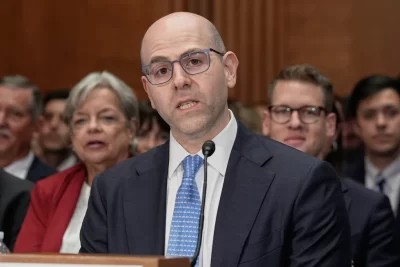
As a state representative running a longshot campaign for South Carolina governor, Nikki Haley would often explain her opposition to abortion with a story about her family.
“I’m strongly pro-life, very pro-life, and not because my party tells me to be, but my husband was adopted, and so every day I know the blessings of having him there,” she said in 2010.
She won that race and was reelected as governor before serving as former President Donald Trump’s United Nations ambassador. She’s now competing against Trump as the only woman seeking the Republican presidential nomination. And in a primary race animated by questions over the future of abortion access in the U.S., Haley is reviving the personal anecdote she would give in South Carolina — almost verbatim.
“I am unapologetically pro-life, not because the Republican Party tells me, but because my husband was adopted, and I live with that blessing every day,” she told a New Hampshire audience in May.
Haley is gaining attention in the GOP race with her calls for “consensus” around abortion, an unusual tone in a campaign where Republican White House hopefuls often prefer to highlight their eagerness to fight President Joe Biden and other Democrats. Her supporters say she has staked out a consistent approach from her earliest days in politics, challenging fellow Republicans to be pragmatic in their pursuit of a deeply conservative agenda.
“Nikki’s doing what she’s always done,” said Nathan Ballentine, a South Carolina lawmaker who served with Haley in the Legislature and has endorsed her presidential bid. “She’s being honest with the people and will just let it go from there.”
Haley has urged Republicans to not push for a national abortion ban with next to no chance of passing Congress, a view she articulated to millions of viewers during the first presidential debate last month and is likely to reinforce when Republican candidates other than Trump gather for another debate on Wednesday.
“Leadership is about bringing out the best in people — that’s what Nikki’s always done,” Haley campaign spokesperson Olivia Perez-Cubas said. “Her approach will save more babies and support more moms than demonizing the issue.”
Some of her competitors — including Sen. Tim Scott, her fellow South Carolinian and erstwhile ally — have criticized her for not standing more firmly for what they say are conservative principles.
“What she ultimately might want, versus what she knows she can get done as an effective leader, are two different things,” said Ballentine, who co-sponsored anti-abortion legislation with Haley when she served in the state legislature. “And she’s not going to mislead the public and make them think that they’re going to get something … when she knows the reality is, the votes aren’t there in the Senate, and that it’s a process you have to work through.”
While Trump remains dominant in the primary, many Republican voters say they’re open to a new nominee. Haley has tried to distinguish herself with her defense of a muscular U.S. foreign policy, citing her experience as U.N. ambassador, and by dismissing her competitors as men fighting with each other.
During one squabble in the first GOP debate, Haley cut in with a reference to a famous line from Margaret Thatcher, Britain’s first female prime minister: “If you want something said, ask a man. If you want something done, ask a woman.”
In 2010, Haley identified with the then-nascent tea party, a state legislator who advocated for spending cuts. Running against three men, Haley attacked what she called the “good ol’ boys” dominating the state’s politics.
As a state legislator and governor, Haley supported several anti-abortion measures and often clashed with members of her party because she labeled them insufficiently conservative. She issued “report cards” to the Republican- and male-dominated legislature, grading them on how they voted on her priorities.
While serving in the state House, Haley co-sponsored legislation in 2009 mandating a 24-hour waiting period between a woman’s abortion consultation and the procedure itself. The bill, signed into law the following year, also required that women receive information about calculating a fetus’ gestational age and a list of free ultrasound providers.
The following year, she voted to end abortion coverage for victims of rape and incest in the state health plan for employees; the Senate defeated that proposal.
As governor, she signed the most conservative abortion bill South Carolina Republicans were able to pass through both chambers at the time. Supporters of the legislation, referred to colloquially as the “pain capable” bill, cited the disputed claim that a fetus can feel pain at 20 weeks. It allowed exceptions only if the mother’s life was in jeopardy or a doctor determined the fetus can’t survive outside the womb, but not for rape or incest.




